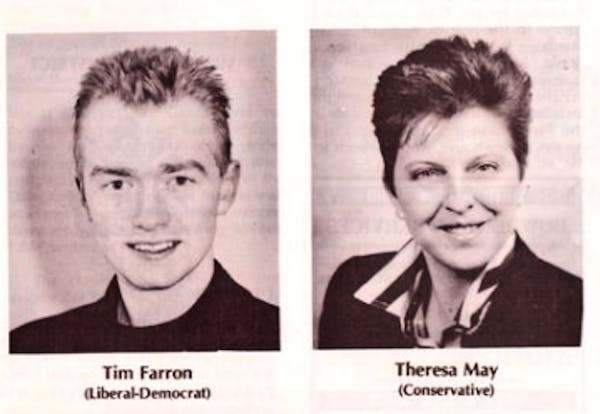There’s a mischievous, not to say malicious, Twitter photograph of Theresa May circulating this morning. It shows her sporting shoulder pads and severely slicked-backed boyish hair, campaigning in the 1987 general election. On top of it someone has added the words: ‘Curbing the promotion of lesbianism in Merton’s schools starts with girls having male role models in their lives’.
 Did she say it? No one can source the quote. But Mrs May, then as now a weekly churchgoing Anglican, did vote against the repeal of Section 28 in 2000. In those days she was an opponent of same-sex marriage, as was Tim Farron, also a weekly churchgoer.
Did she say it? No one can source the quote. But Mrs May, then as now a weekly churchgoing Anglican, did vote against the repeal of Section 28 in 2000. In those days she was an opponent of same-sex marriage, as was Tim Farron, also a weekly churchgoer.
Both the Prime Minister and the Lib Dem leader held this view for religious reasons, though they preferred not to be drawn into theological debate. Both have now decided that God is cool with gay marriage. Indeed, Farron – who in 2007 believed that abortion was plain wrong ‘at any time’ – has now conveniently discovered that He’s also pro-choice. (NB: I’m not equating the issues of homosexuality and abortion, just noticing the similar direction of travel.)
So: this is the first general election for decades in which two of the three party leaders are enthusiastic Sunday churchgoers, but their moral compass seems to flicker as fast as that of the general public (or electors, as they’re also known). Why? Are their arms being twisted or do their twist of their own accord?
On this week’s Holy Smoke podcast, Nick Cohen talks to Cristina Odone and me about the secularisation of British politics. His opinions are massively more entertaining and unpredictable than those of Mrs May or Mr Farron. Hold on to your seat belts and listen here:
And do subscribe on iTunes for a new Holy Smoke every other Monday.







Comments